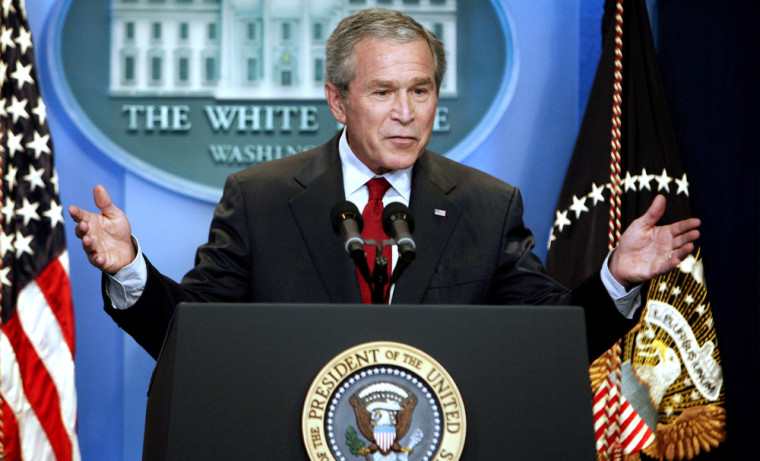To see the type of person who still backs him, President Bush need only look in the mirror.
The president fits the composite of today's Bush supporter: a conservative, white, Republican man, an evangelical Christian who goes to church regularly.
Hammered by bad news in Iraq, congressional investigations and recent failed domestic initiatives such as immigration reform, Bush's job approval rating has spiraled to record lows for his presidency. Two-thirds of Republicans and about one-third of independents still support him, but virtually no Democrats are left in Bush's camp.
Bush says he leads and is not led by popular opinion. Yet the lower his polls go, the harder it is for him to push his agenda - and bump the polls up when he has good news to impart.
"Maybe he's got it right, but hardly anybody believes him," said University of Virginia political scientist Larry Sabato.
The Iraq factor
Overall, just one in three Americans approves of the job he is doing, according to a July AP-Ipsos poll. That's a long fall from his 90 percent approval rating after the Sept. 11, 2001, attacks.
"I don't think he likes being in that category, but for better or for worse, he believes he's right and he'll take his judgment with history," said Steve Roberts, a veteran GOP activist. "If he were interested in polls and popularity, he would have moved a lot quicker on Iraq."
"He's in a funny position," said Roberts, a National Republican Committee member from Iowa where a straw poll this Saturday will further narrow the race for the 2008 Republican presidential nominee. "He's a lame duck, but everybody's looking to him about what's going to happen in Iraq."
Presidential supporters
If the president wants to buck up his support, he has less than 18 months to do so. He could start by attracting back more of the voters who support him most.
Last month's AP-Ipsos poll showed that:
- Among age groups, his highest approval comes from the 40s set.
- Whites and Hispanics like him better than blacks.
- Rural residents like him more than city folk.
- Married couples support him more than singles.
- Voters in the South and West like Bush better than those in the Midwest and Northeast, although the differences are slight.
- The only subgroups where a majority of people give Bush the nod are Republicans (67 percent), conservatives (53 percent) and white evangelicals who attend religious services at least once a week (56 percent).
These are the same three subsets of voters who support Bush on Iraq.
White evangelicals as an entire bloc - regardless of how often they report going to church - have been a reliable support group for Bush since he first set foot in the Oval Office. But even their overall approval of the president declined to 44 percent last month from 57 percent in May - a decline driven partly by bad news from the battlefield in Iraq and conservatives' opposition to Bush's ideas on immigration.
War on terror
Robert Heiser, a 53-year-old floor covering businessman turned real estate salesman from Myrtle Beach, S.C., said that other than Bush's stand on immigration, he backs the president's position on the war in Iraq, the war on terror and homeland security.
"The Democrats keep complaining and whining about intrusion or privacy and all that," Heiser said. "If we didn't have that, then the terrorists would be blowing us up. The stuff he's done is what's protected us. Every big city in this country is pretty much liberal, but guess where the terrorists are going to hit first? They're going to hit the big cities. That's what I think is so funny about the Democrats."
The war is both the reason why some Republicans are straying from the party and other Republicans are sticking by Bush's side.
Staunch Bush supporter Edward Kinzer, 39, an account manager from Trussville, Ala., can't understand the backlash against the president.
"I find it odd that people want to criticize someone who is trying to stop the evil," said Kinzer, who said he sees Bush as a kindred spirit on religious beliefs. "I know it's costing lives, but people who sign up to be in the armed services commit themselves to the cause of freedom," he said.
On the other hand, a few percentage points of Republican voters have discarded the GOP label over their opposition to the war. It's unclear whether these Republicans have abandoned the GOP for good, or whether they just don't want to be labeled "Republican" when they talk to pollsters, said Robert Y. Shapiro, a Columbia University political science professor who specializes in public opinion and politics.
Still, he predicted that Bush's strongest Republican supporters probably won't abandon him unless there is a major scandal, they get sufficiently upset about the Bush administration's penchant for secrecy, or if the flap over the firing of U.S. prosecutors knocks Attorney General Alberto Gonzales out of his job.
"That might warrant those strong supporters leaving him, but that hasn't happened," Shapiro said. "These are the people who have really stuck by him. We don't know if he's hit rock bottom."
